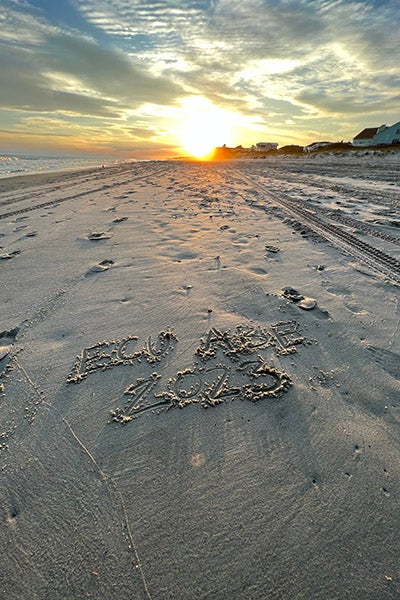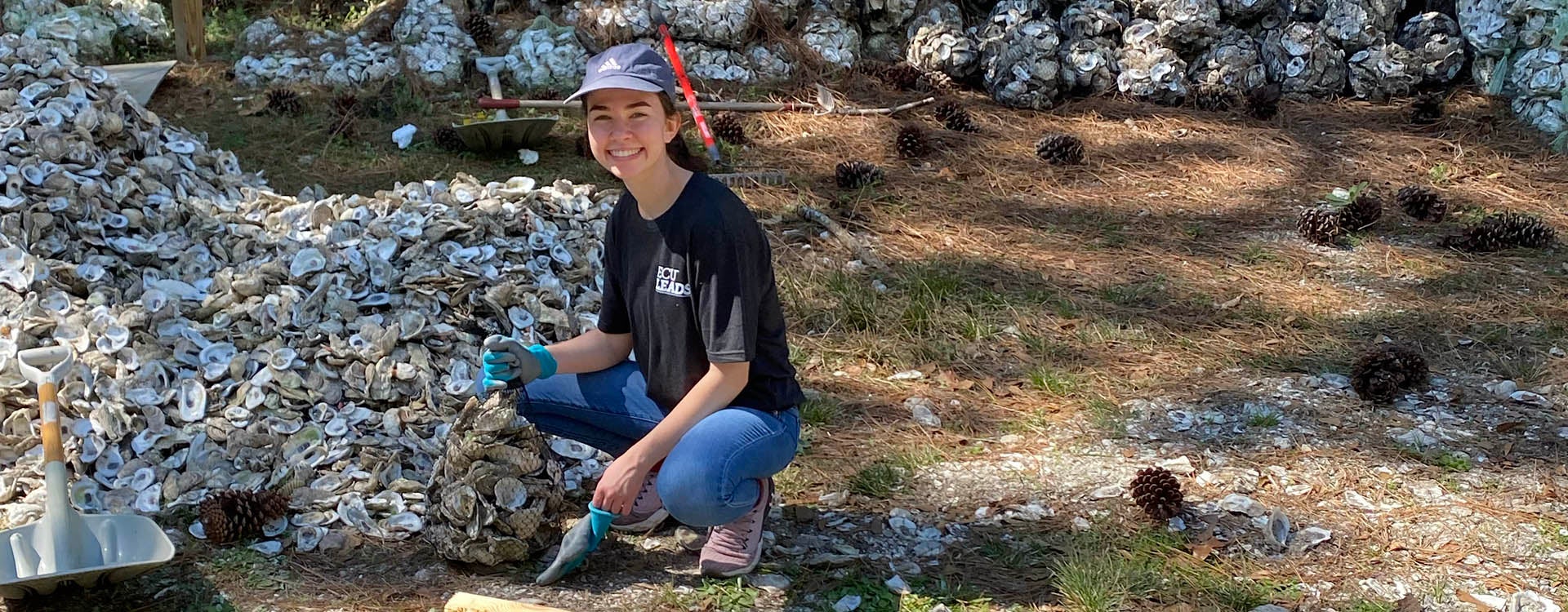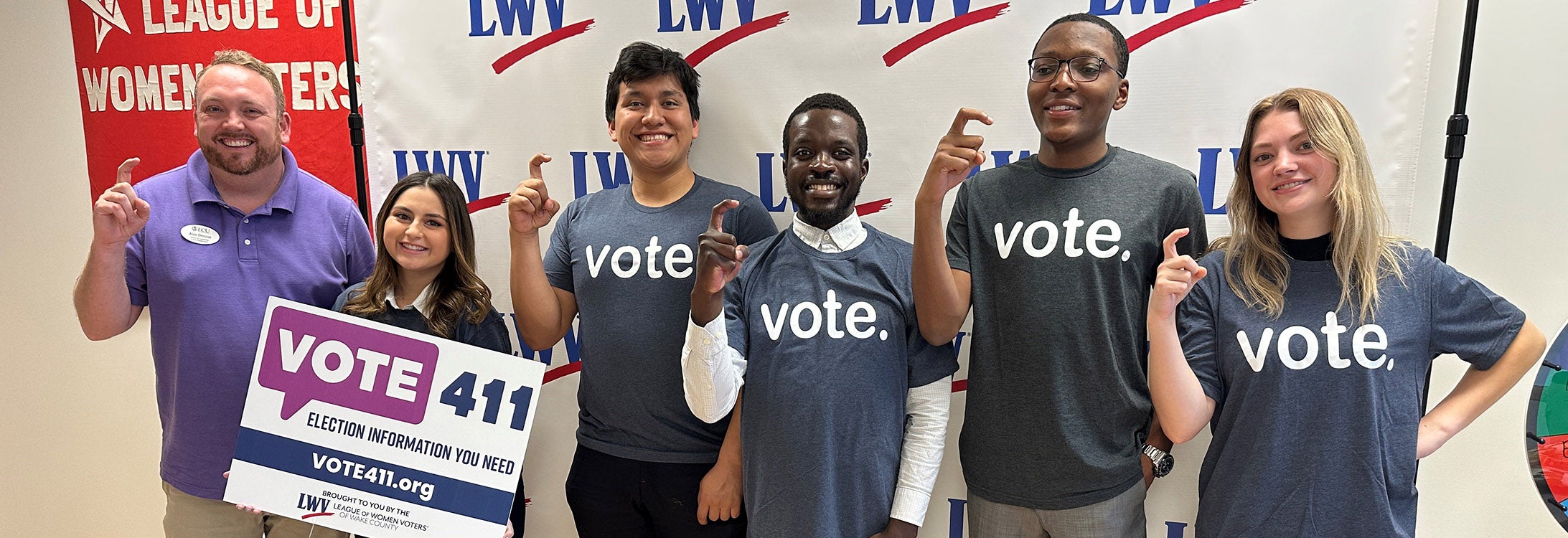Alternative Spring Break Experiences
Students, staff provide helping hands across the state over spring break
Sarah Elliott, Claire Mack and Tete Narh-Mensah spent last week at the coast, not an uncommon destination for East Carolina University students on spring break.
The difference was their objective — they were among almost 40 students and staff who volunteered to work with community groups across North Carolina through ECU’s Alternative Break Experience.

Alternative Break Experiences (ABE) are learning opportunities that immerse ECU community members in diverse environments that address social, economic, political, environmental, spiritual and cultural issues through the exchange of ideas, personal reflection, critical thinking and applications of academic concepts beyond the classroom.
Elliott, Mack and Narh-Mensah worked with the N.C. Coastal Federation to bag oyster shells to build a living shoreline, pick up trash along beaches, mark bird nesting sites on Bear Island and help prepare a community garden. ECU’s Center for Leadership and Civic Engagement has taken students to Carteret County for more than 10 years in its longest running ABE partnership.
“Talking with service leaders in these different sites, it was clear to me that even though we face concerning environmental issues, we have some great minds and hearts dedicated to protecting our precious ecosystems,” said Elliott, who is in her second year in ECU’s Honors College majoring in nutrition and dietetics.
Elliott enjoyed working outside and learning more about coastal environments and the nonprofit organization’s mission. “I also learned about the value of teamwork and how people with different skill sets can work together successfully to accomplish a goal,” she said.
Narh-Mensah said one of the things that stood out was how big problems go under the radar.
“During our trip, we learned that islands along Emerald Isle are getting smaller and smaller. At first glance, it doesn’t seem like a big issue, but after learning more about it you learn that this displaces animal species, removes resources and has the potential to impact life on other islands,” he said. “Due to this, many of the organizations like the North Carolina Coastal Federation do not get the support I think they deserve.”
Narh-Mensah, an EC Scholar who is majoring in biology, wanted to participate in this ABE because he enjoys doing things to help others and address problems in his off time. “I wanted to meet new people and explore a new place. This ABE trip was a combination of all of these elements.”
Over last spring break, he volunteered with ABE in Raleigh, while Elliott traveled with the Honors College to Asheville to do cleanups and trail maintenance with RiverLink, a nonprofit environmental group. “This year it was fun to participate in an ABE on the other side of the state,” Elliott said.
Although it was Mack’s first ABE trip, it has inspired her to continue volunteering on her own. “My main takeaway from this trip was how I was able to directly contribute to environmental conservation,” said Mack, a senior majoring in public health with a concentration in community health. “The students on this trip were really fun and hardworking, and Katy (Locke) was an awesome leader!”
Elliott said she is grateful to the Center for Leadership and Civic Engagement (CLCE) for organizing, sponsoring and leading the trip, the main goal of which is to serve. “Programs like these show ECU’s commitment to its motto: Servire,” she said.
Along with the N.C. Coastal Federation, the CLCE partnered with Asheville, Durham and Raleigh organizations to provide ABE opportunities.
The ECU Military and Veterans Resource Center sponsored the Asheville trip for students who identify as a veteran and/or child or spouse of a veteran. Led by the center’s director, Nicole Messina, students worked with staff at Veterans Restoration Quarters to help homeless veterans.
ECU’s Dr. Jesse R. Peel LGBTQ Center and the Women and Gender Office led by Chelsie Hargrove and Rose Bogue took students to Durham for service activities that explored gender, feminism, LGBTQ history and women’s rights. Students volunteered at the Diaper Bank of North Carolina, a nonprofit that helps families with babies and children living with poverty.
Raleigh’s trip, led by the CLCE’s Alex Dennis, was dedicated to citizenship. ECU students helped register voters in partnership with the League for Women Voters and worked with World Relief and the Food Bank. The students had the opportunity for dessert and discussion with Raleigh resident Mitchell Whitley, the founder of Mitchell’s Mayors, who is on a mission to meet every mayor in North Carolina. The group also visited the N.C. governor’s mansion, General Assembly and Supreme Court.

ECU student Sarah Elliott helps bag oyster shells to build a living shoreline in Carteret County.
